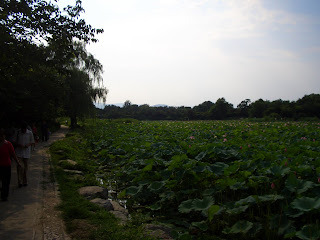


Welcome to 'Who wants to be a grass millionaire?'. You as a candidate have to answer the questions as good as you can by yourself - apart from that you can use a joker, our grassland cow, our grassland sheep or our grassland horse. But be careful, a 'moo' from the cow might not imply the right answer.
Question 1: Where did the grassland travellers from Beijing (i.a. Katharina, her colleague-friend Ya Jun with daughter Sisi / Julia sleep?
a. in a farmer's residence. The room was just big enough to fit in three beds next to each other and nothing more. The bathroom had a comfortable Chinese style toilet with infrequent water and a wash basin with no water.
b. on a horse like real Chinese grassland cowboys.
a. in a farmer's residence. The room was just big enough to fit in three beds next to each other and nothing more. The bathroom had a comfortable Chinese style toilet with infrequent water and a wash basin with no water.
b. on a horse like real Chinese grassland cowboys.
Question 2: What are the specifics of a Chinese grassland (5 hours drive from Beijing, named Bashang)?
a. the Olympic discipline of counting sheep did take place there. No gold medal was given to the winner as doping was suspected because the winner had eaten a sheep the day before.
a. the Olympic discipline of counting sheep did take place there. No gold medal was given to the winner as doping was suspected because the winner had eaten a sheep the day before.
b. grass, grass, grass everyhere, small hills, some flowers, seldomly ever trees, wild horses, shepherds with sheeps, cows with cowboys on motorbikes, small rural villages.
Question 3: Can you imagine the writer of this blog on a horse?
a. Yes, but the poor horse!
b. She managed to ride a horse for the second time in her adult life (for four hours). Although the landscape around her was nice, after that her bum was quite sore and she swore to herself not to ride a horse again soon.
Question 4: Do you think she also mounted a horse in the afternoon?
a. What a stupid question - Of course not! She went on a jeep along bumpy streets (well, not really streets, but earthern country ways without asphalt and plenty of puddles). When she and her co-travellers arrived at the destination, the wind was so cold that they preferred to take some photos and quickly get on the jeep again.
b. She is now a 'Hanni & Nanni' kind of woman, bought herself a horse and rode back all the way to Beijing where her horse is now living with her in her city apartment.
a. Yes, but the poor horse!
b. She managed to ride a horse for the second time in her adult life (for four hours). Although the landscape around her was nice, after that her bum was quite sore and she swore to herself not to ride a horse again soon.
Question 4: Do you think she also mounted a horse in the afternoon?
a. What a stupid question - Of course not! She went on a jeep along bumpy streets (well, not really streets, but earthern country ways without asphalt and plenty of puddles). When she and her co-travellers arrived at the destination, the wind was so cold that they preferred to take some photos and quickly get on the jeep again.
b. She is now a 'Hanni & Nanni' kind of woman, bought herself a horse and rode back all the way to Beijing where her horse is now living with her in her city apartment.
I know that was a tough challenge. So here's the right answers: a,b,b,a. The winner of 'Who wants to be a grass millionaire' receives just a blade of grass, not a million of grasses due to the game manager's contribution to environmental programs - Congratulations nevertheless! By the way: The author of this blog had quite some fun in the grassland despite the excellent accommodation, her pain and bumpy country roads thanks to the people coming along on this trip and the beautiful countryside (well, the grass basically...).





































